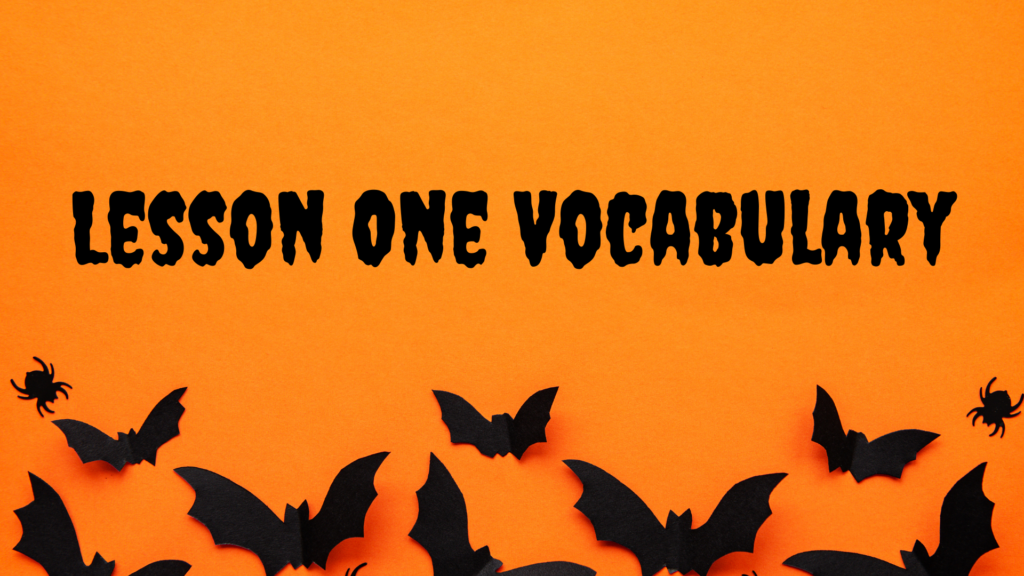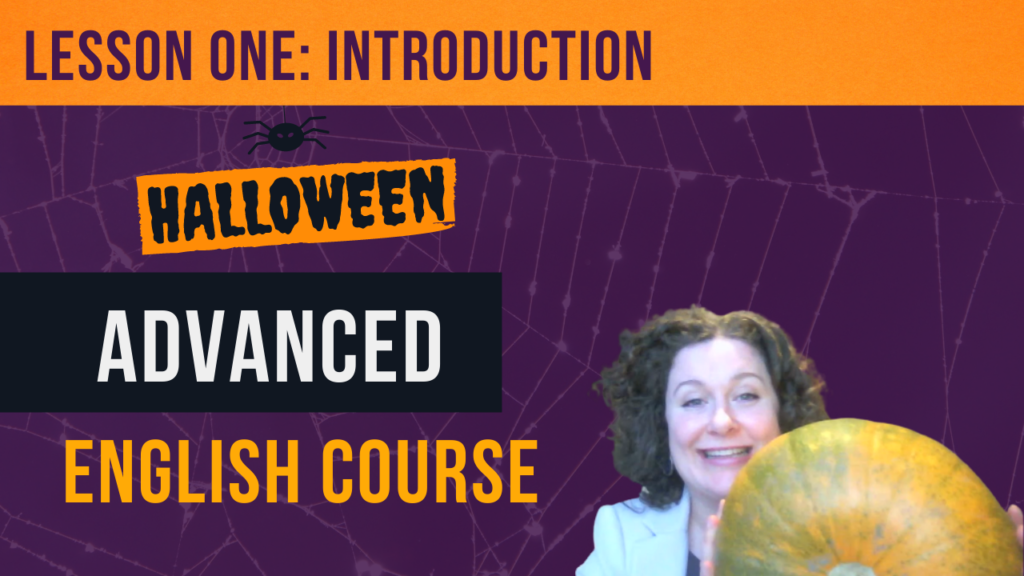Lesson One: Introduction
Transcript:
Pumpkins, pumpkins and more pumpkins….
… Introduction to Halloween
What do you already know about Halloween?
Can you explain the history of Halloween?
Take a moment and write down your thoughts.
As I mentioned, my house is full of pumpkins that I will soon carve with my pumpkin-crazy beautiful little boy. Some of them we grew ourselves him and I – back in March we grew them from seed and have been caring for them carefully ever since. Most though, we’ve picked up either at the Farm Shop or just at the supermarket. As soon as it gets to October, the shops are just full of many different types of pumpkins and he pretty much begs us to buy a pumpkin any time we leave the house.
As my Facebook memories remind me, the October holidays from teaching are usually spent, growing pumpkins, buying pumpkins, carving pumpkins, making pumpkin related food and then playing with the Jack O’Lanterns. (That’s the name for the finished product after you’ve carved the pumpkin and put a candle in.) Now we always put a fake candle – with a battery obviously – for safety… but – yeah – the Jack O’Lanterns are pretty cute I must say! So in our house, Halloween is almost entirely pumpkin related! It’s very pumpkin-centric. It’s heavily focused on how much my little boy LOVES pumpkins.
For most people though, if I asked them to describe Halloween, other than the carved pumpkins, they would mention that it is a celebration of all things spooky and that children wear fancy dress and they go trick or treating.
Let’s just press pause for a moment. The word “spooky” means sinister or ghost-like in a way that causes fear or unease. It’s a word that is strongly connected to Halloween. That’s the only meaning of it I have ever known.
However, since filming this video, I myself have learned something I did not know. I stumbled across an online debate that started here in Scotland when the National Theatre of Scotland questioned whether it was acceptable to use the word “spooky” on their Halloween promotional material.
Apparently, during the Second World War, the word “spook” was unfortunately used in a racist context to describe Black pilots.
The context of how a word is used is of course really important and most people do not know the history of the word and so you will see it being used in adverts and on T.V throughout English speaking countries.
However, for me, “when you know better you do better” and it seems such a small piece of work to remove words that could be offensive from my vocabulary.
I’ve left the word in this video to open up this discussion but have chosen to add in this important edit to say that while you will see the word commonly used, from now on, I personally will be using one of these synonyms: ghostly, frightening, chilling, eerie or scary.
While Halloween is indeed a really big deal in the States, the Halloween traditions actually come from here in Scotland and England and Ireland.
So Halloween is celebrated on the 31st of October and it derives from the Celts who lived mostly in the areas that are now Ireland, the United Kingdom and the Northern part of France around 2,000 years ago. Their New Year was on November 1st and the festival of Samhain (meaning “summer’s end”) was the night before. Samhain marked the end of summer and the harvest time (representing life) and the start of winter (representing death).
The festival marked the boundary between the worlds of the living and the dead. They would light fires and wear costumes to ward off ghosts that they believed returned to Earth on that night. The Celtic priests would make sure that the hearth fires of each fire were lit from the sacred bonfire to keep the house safe through the winter. They would also foretell the future and people hoped to hear prophesies that would be soothing through the difficulties of the dark cold winter.
Basically, it was all about preparing for surviving the cold dark winter which, as the days start to get colder and colder this time of year, I can well imagine how important that would have felt for them.
In the 9th century, the influence of Christianity had begun to blend with and overcome Celtic traditions and it is thought that the church did indeed want to replace the Celtic traditions and so they made November 2nd All Souls Day as a day to honour the dead and celebrated it very similarly to Samhain by having big bonfires and parades and dressing up in costumes as saints and devils.
Another name for this All Souls Day was All-hallows (meaning All Saint’s Day in Middle English). We still commonly use the word “hallowed” to mean “made holy or made sacred.”
The night before All Souls Day or All-hallows which had been Samhain in the Celtic religion began slowly to be called All-Hallows Eve which eventually became Halloween.

Pumpkin- crazy (adjective)
The suffix –crazy can be used to form adjectives which show what someone is extremely enthusiastic about.
E.g. I used to be fashion-crazy when I was a teenager but now I don’t follow it so much.
Pretty much (phrase / qualifier)
= mostly; almost completely
E.g. Are you ready to leave? I’ve pretty much loaded all the luggage into the car.
Pumpkin-centric (adjective)
The suffix -centric can be used to form adjectives that express that an object, person or idea is at the centre or is the focus of attention.
E.g. The U.K curriculum in schools has been far too eurocentric at times.
(Note there are words such as eurocentric that formally exist and there are words such as pumpkin-centric which is a made up word created for emphasis. We usually use a hyphen when the word is a made up one.)
A celebration of all things ____ (phrase)
This phrase is usually used to describe festivals or events that focus on one theme.
E.g The literary festival was a celebration of all things poetry.
A big deal (phrase)
= something that is considered important.
E.g. At my first job I was so relieved when the boss didn’t make a big deal out of my first mistake.
derive from (phrasal verb)
= to come from a particular source.
E.g. Many authors claim their stories derive from their own past personal experiences.
To ward off (phrasal verb)
= to prevent someone or something from harming or affecting you.
E.g I like to eat lots of garlic when I start to feel poorly so I can ward off the flu.
Hearth (noun)
= the fireplace or floor of the fireplace in a home.
E.g. My cat likes to curl up by the hearth and look at the flames.
Prophecy (noun)
= the foretelling of a prediction of what is to come.
E.g. The film makes a bleak prophecy about the impact of climate change.
Soothing (adjective)
= to have a gently calming impact.
E.g. After a long day, she found the quiet sound of the train rattling on the tracks quite soothing – so much so that she almost fell asleep.
